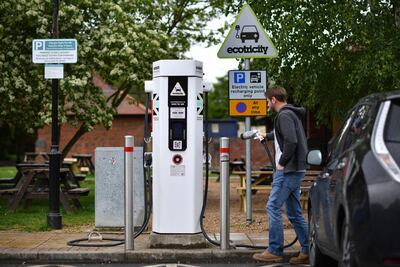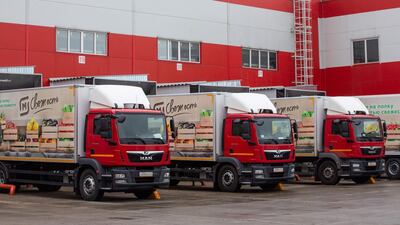Countries including Germany and Canada are hoping for an agreement at the Cop26 climate summit to scrap polluting lorries in favour of electric trucks.
The boom in online shopping during the pandemic has led to concerns that increased emissions from heavy goods vehicles will foil attempts to keep global warming below 2°C.
With Cop26 drawing closer, discussions are under way about a pact to be presented to world leaders in Glasgow in November that would make zero-emission trucks the norm by 2050.
“The e-commerce boom brought on by the Covid pandemic has likely permanently changed our transport needs,” said Cristiano Facanha, the global director of Drive to Zero, a project that backs the push for a deal.
“National and subnational climate plans must address this new reality if we hope to reach net zero emissions by 2050.”
Online sales soared in 2020 after shops closed and customers were confined to their homes to limit the spread of Covid-19.
While trucks only account for 4 per cent of road vehicles worldwide, they are responsible for more than a quarter of greenhouse gas emissions, Mr Facanha said.
Calstart, a green transport firm, says dozens of models of zero-emissions lorries are already on the market in Europe, North America and China.
Some of these are capable of driving 185 miles on a single charge. Trucks with a range of more than 600 miles are expected on the market from 2023.
Mr Facanha was chairing discussions on Monday at the Clean Energy Ministerial, a summit described by Britain as the most important green energy conference before Cop26.
Germany, Canada, Sweden and the Netherlands are among the countries to have signed up to the Drive to Zero campaign.
The Netherlands hopes to produce a draft memorandum of understanding for Cop26 in the coming months.
Dutch infrastructure minister Stientje van Veldhoven said she hoped many more countries would sign up to a deal before Cop26.
“If we set ourselves a goal, we’re going to find a way to get there in time,” she said.
“If we look at the time we have left to solve this puzzle, we cannot start [with] the theory only. We need to define our goal.”

Call for electric infrastructure to help green transition
Scaling up the use of green lorries will require investment in charging equipment for electric vehicles.
Germany will need to install up to 1,200 lorry chargers on its motorways in order to meet EU climate targets.
Aaron Hoskin, a delegate from Natural Resources Canada, said charging equipment needed to be available across borders.
“It’s fine and dandy to have vehicles on the road, but if those vehicles can’t charge in the next jurisdiction because of differences in regulations and codes and standards, there’s no point. That’s the nature of transportation,” he said.
Sebastian de Toro, a state secretary in Sweden’s infrastructure ministry, said Swedish firms Volvo and Scania expect more than half of the country’s new trucks to be fully electric by 2030.
The push for greener transport should involve producing batteries and steel products in a more environmentally friendly way, he said.
“When it comes to road transport, the technologies are here. Now is the time for implementation."






Britain, which is hosting Cop26, is aiming to end the sale of petrol and diesel cars by 2030 but is still looking at plans for heavy freight vehicles.
Rachel Maclean, an under-secretary of state in the UK’s transport department, said Britain would work with the Drive to Zero campaign before the Glasgow summit.
“By working together, we can make the zero-carbon transition faster, cheaper and easier for all,” she said.

